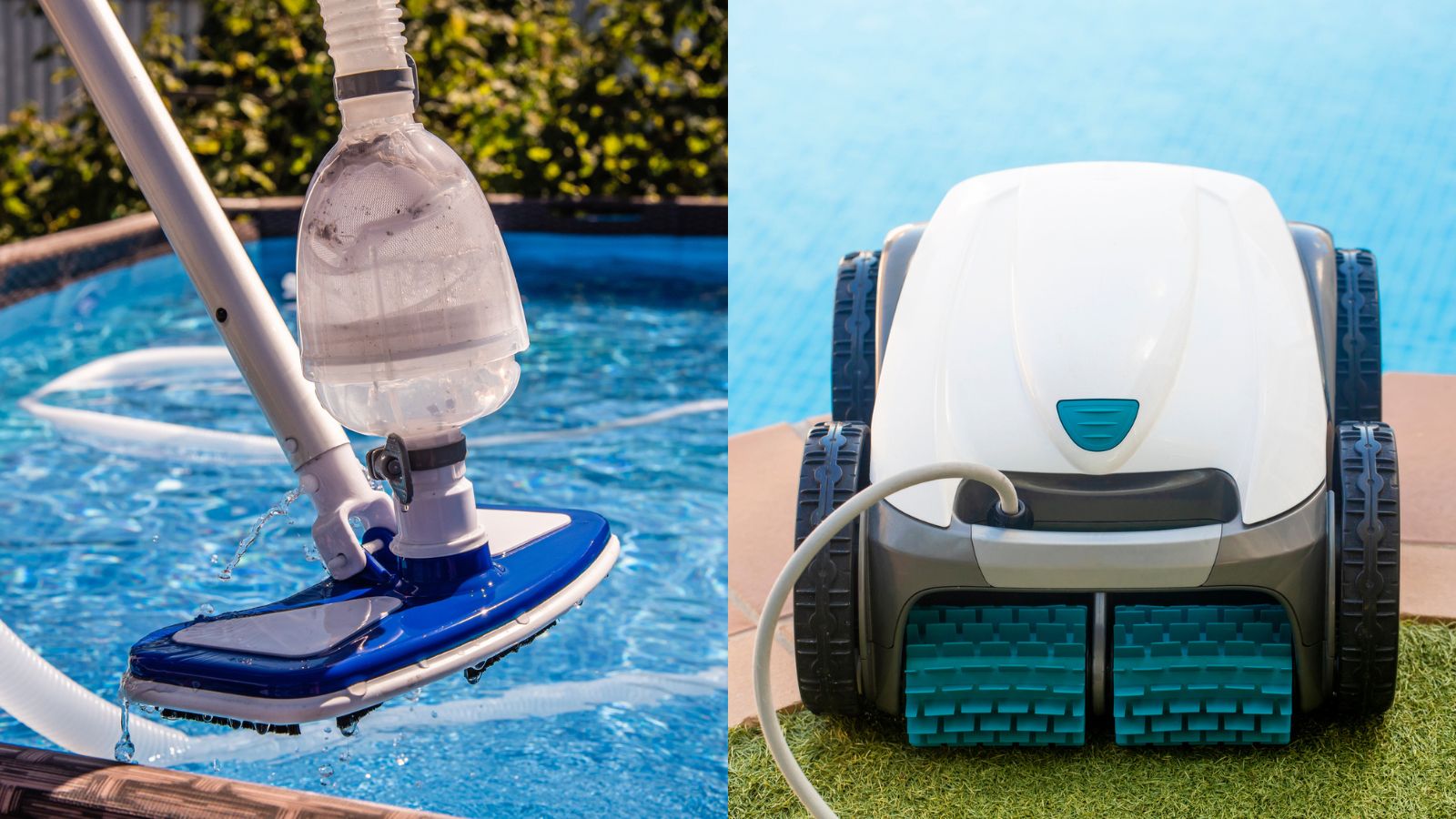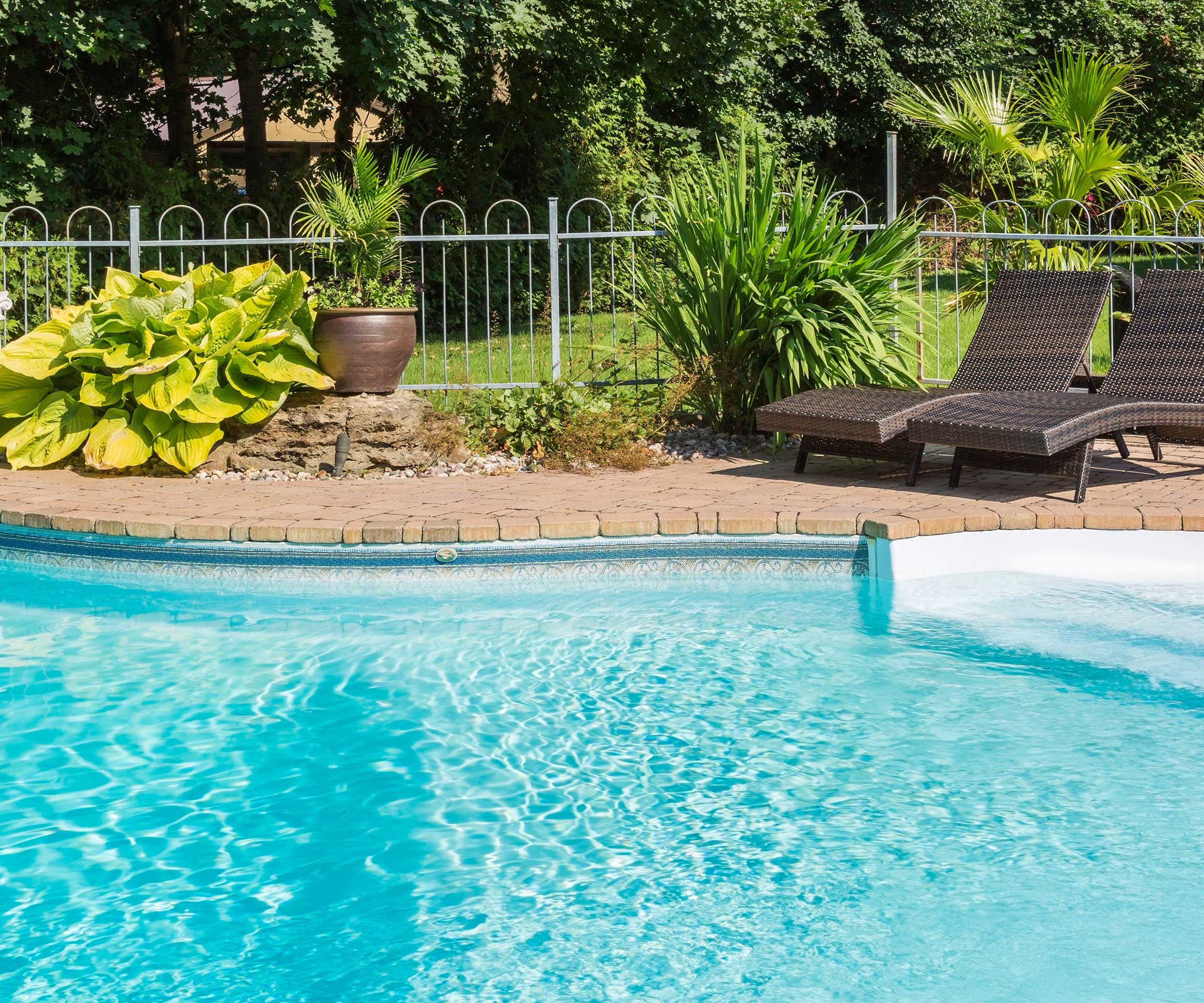
Congratulations: you've just bought a home with a pool. It looks great, adds a bunch onto the resale value, and is perfect for entertaining family and friends. But before you start doing victory laps, spare a thought for your pool vacuum.
Pool vacuums are a tedious but essential part of pool ownership. Without one, all the chlorine in the world won't save you from dirt collecting up the sides and pooling in the bottom.
There are two options: a manual vacuum - which takes a little elbow grease - or a robot vacuum - which takes a lot of money. I spoke to a pool expert about the benefits and drawbacks of both types to help you choose.

What's the difference between a manual pool vacuum and a robot pool vacuum?
The difference between the two types is fairly straightforward. A manual pool vacuum is a suction pump on the end of a long pole, used to remove algae and dirt from the bottom and sides of a pool.
A robot pool vacuum does the same thing, but automatically. You just have to put it in the pool and it will work by itself, vacuuming the pool for you and saving the labor.
What are the benefits of a manual pool vacuum?

The biggest benefit of a manual pool vacuum is that it's cheap. Robot pool vacuums can cost hundreds if not thousands of dollars, and you can find pool vacuums for under $100.
Another benefit is that you can see your work and easily fix it. A robot vacuum can't 'see' what it's doing, and they often miss patches. With a standard pool vacuum, you have total control over your work and can quickly clean up anything you've missed.
If you want to clean a pool on a budget, this simple vacuum will do the job. It takes a little effort but will save you hundreds of dollars.
What are the drawbacks of a manual pool vacuum?

Unsurprisingly, manual pool cleaners take a little elbow grease. Depending on your pool size, if you have overhanging trees, and how much chlorine you use in your pool, vacuuming with a manual pool vacuum will probably take half an hour to an hour of cleaning. It's not an everyday task, but you may find that vacuuming your pool by hand once a week is a little effortful and time-consuming when all you really want to do is swim.
Manual pool vacuums also run on the pump for your pool, sucking dirt and algae into your pool filter. In the short term, there's nothing wrong with this, but in the long term, you need to keep an eye on your pool filter and regularly clean it by hand so that everything is working effectively.
What are the benefits of a robot pool vacuum?

Robot vacuums take all the hassle out of vacuuming your pool. They do the work for you, saving you from a tedious chore. Pool expert Rafi Friedman told me that 'Robotic pool vacuums require much less time and effort to use effectively. Once you've set them up and programmed them, your work is done, aside from perhaps plugging it in to charge between uses.'
Unlike some hands-free suction vacuums, robot pool vacuums can clean the bottom, sides, and steps of the pool, saving you from the fiddly work on these surfaces. They're also almost silent, unlike manual vacuums which have to plug into the pump. This means you can run them early in the morning or late at night when you aren't using the pool, so it always looks at its best.
Robot pool vacuums also have their own filters and pumps, so you don't need to play around with the pump pressure on your pool or clean your pool filters after you use it. In fact, they are usually more powerful than a manual vacuum, which often makes for a better clean. All in all, pool expert Rafi told me that 'I definitely recommend robotic vacuums for those who can afford them. They're generally quite reliable, and they take a lot of the work out of pool ownership.'
If you want the easiest clean possible, you need this robot pool vacuum. It's controlled from an app, and can clean the floor and walls of any pool.
This model is a little cheaper than Maytronics' other robot pool vacuums, and unlike their top-line vacuums, this will also work in above-ground pools.
The WYBOT Osprey200 offers automated robotic cleaning on a budget. The only drawback is that it can't clean along walls.
What are the drawbacks of a robot pool vacuum?

Robot pool vacuums are very expensive, and prices tend to start from $500. It's a lot of money to spend when you could buy a manual vacuum for ten times cheaper and do the job yourself.
While it's great that robot vacuums have their own filters, these are small and quickly fill up with leaves, so it's another chore to empty them, too.
While these pool vacuums are less effortful than a manual pool vacuum, they're not entirely automatic. You still have to place them in the pool and fish them out when they're done, as well as rinse them off and put them in storage.
They also tend to take longer than manual pool cleaners, though if you run them in the evening while you cook or watch TV this shouldn't be an issue.
Pool vacuum FAQs
What is a suction pool vacuum?
Suction pool vacuums are like a hybrid of manual and robot vacuums. Like robot vacuums, they work unattended, but like manual vacuums, they work by using your pool pump to suck up debris. They're a hybrid of the two styles with all the benefits and drawbacks of both. You need to know what you're doing with pool pumps to get one working, but once you do it will clean your pool without you having to intervene.
For more help with your pool vacuum, take a look at our deep dive into why your pool vacuum may not be working.







